June 19, 2023
Institute of Human Virology-Nigeria (IHV-Nigeria) was established in 2004 as an affiliate of the Institute of Human Virology, University of Maryland School of Medicine, Baltimore, USA
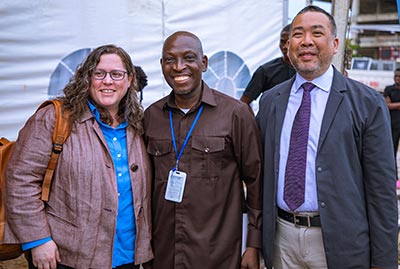 The Institute of Human Virology-Nigeria (IHV-Nigeria), an affiliate of the University of Maryland School of Medicine’s (UMSOM) Institute of Human Virology (IHV), recently announced the launch of its state-of-the-art multi-campus of excellence in public healthcare, treatment training, and research to bring quality health services within the reach of millions of Nigerians.
The Institute of Human Virology-Nigeria (IHV-Nigeria), an affiliate of the University of Maryland School of Medicine’s (UMSOM) Institute of Human Virology (IHV), recently announced the launch of its state-of-the-art multi-campus of excellence in public healthcare, treatment training, and research to bring quality health services within the reach of millions of Nigerians.
The IHV-Nigeria Campus, located on Plot 62, Emeritus Umaru Shehu Avenue, Cadastral Zone, COO, Abuja, is a combination of leasable office buildings, clinical laboratories for diagnosis, research, and training; functional clinic spaces for patient care and clinical trials; bio-specimen repositories for storing and managing bio-specimens; and multi-media lecture auditoriums, meeting rooms, and offices.
 Participants from the University of Maryland, Baltimore (UMB) included via video Bruce E. Jarrell, MD, FACS, President of UMB; UMSOM Dean Mark T. Gladwin, MD, Vice President for Medical Affairs at University of Maryland, Baltimore, and the John Z. and Akiko K. Bowers Distinguished Professor; and Robert C. Gallo, MD, Co-Founder and Emeritus Director of the IHV, The Homer & Martha Gudelsky Distinguished Professor in Medicine and Special Advisor to the Dean at UMSOM, and Co-Founder and Chair of the Scientific Leadership Board of the Global Virus Network. Attending in person was Man Charurat, PhD, MHS, Professor of Medicine, Director of the Center for International Health, Education, and Biosecurity (Ciheb), Director of the Division of Epidemiology and Prevention in IHV at UMSOM; Alash’le Abimiku, PhD, Professor of Medicine, Division of Epidemiology and Prevention, at the IHV and Director of the International Research Center of Excellence IHV-Nigeria; Patrick Dakum, MBBS, MPH, Associate Professor of Epidemiology and Public Health, Division of Epidemiology and Prevention, at IHV and CEO of IHV-Nigeria; Kristen Stafford, PhD, MPH, Associate Professor of Epidemiology and Prevention, Division of Epidemiology and Public Health, and Deputy Director of Ciheb at UMSOM’s IHV, and William Blattner, MD, retired Co-Founder of IHV, and current member of IHV’s Board of Advisors.
Participants from the University of Maryland, Baltimore (UMB) included via video Bruce E. Jarrell, MD, FACS, President of UMB; UMSOM Dean Mark T. Gladwin, MD, Vice President for Medical Affairs at University of Maryland, Baltimore, and the John Z. and Akiko K. Bowers Distinguished Professor; and Robert C. Gallo, MD, Co-Founder and Emeritus Director of the IHV, The Homer & Martha Gudelsky Distinguished Professor in Medicine and Special Advisor to the Dean at UMSOM, and Co-Founder and Chair of the Scientific Leadership Board of the Global Virus Network. Attending in person was Man Charurat, PhD, MHS, Professor of Medicine, Director of the Center for International Health, Education, and Biosecurity (Ciheb), Director of the Division of Epidemiology and Prevention in IHV at UMSOM; Alash’le Abimiku, PhD, Professor of Medicine, Division of Epidemiology and Prevention, at the IHV and Director of the International Research Center of Excellence IHV-Nigeria; Patrick Dakum, MBBS, MPH, Associate Professor of Epidemiology and Public Health, Division of Epidemiology and Prevention, at IHV and CEO of IHV-Nigeria; Kristen Stafford, PhD, MPH, Associate Professor of Epidemiology and Prevention, Division of Epidemiology and Public Health, and Deputy Director of Ciheb at UMSOM’s IHV, and William Blattner, MD, retired Co-Founder of IHV, and current member of IHV’s Board of Advisors.
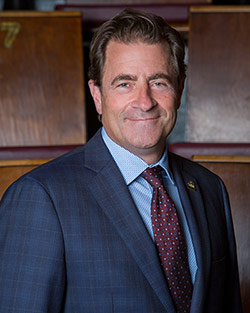 As an internationally recognized local and nonprofit organization, IHV-Nigeria is structured to develop and maintain links with other local and international organizations in collaborative ways that support the Government of Nigeria’s health sector strategic plans. IHV-Nigeria focuses on preventing, treating, and managing diseases such as HIV/AIDS, tuberculosis (TB), malaria, COVID-19, cancer, and other infectious and non-infectious diseases.
As an internationally recognized local and nonprofit organization, IHV-Nigeria is structured to develop and maintain links with other local and international organizations in collaborative ways that support the Government of Nigeria’s health sector strategic plans. IHV-Nigeria focuses on preventing, treating, and managing diseases such as HIV/AIDS, tuberculosis (TB), malaria, COVID-19, cancer, and other infectious and non-infectious diseases.
“This new campus is a testament to the incredible work of local researchers in Nigeria. IHV-Nigeria plays a critical role in advancing scientific knowledge, developing innovative treatments and improving healthcare outcomes for communities,” said President Jarrell. “The work being done at IHV-Nigeria reflects the spirit of innovation and collaboration that defines the University of Maryland, Baltimore.”
“IHV-Nigeria’s modern campus will further advance the SOM and IHV-Nigeria research partnership of already $30 million in NIH-funded studies in the area of HIV, HPV, emerging infectious diseases, non-communicable diseases, and cancers,” said Dean Gladwin. “Furthermore, IHV-Nigeria will continue to be Nigeria’s resource in conducting quality clinical trials, training the next generation of health care providers and researchers, and providing technical assistance in implementing quality management systems to more than 100 laboratories and health facilities that they already support.”

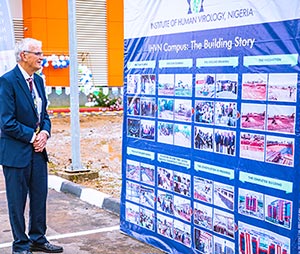 Dr. Dakum, said, "The commissioning of the IHV-Nigeria Campus demonstrates the Institute’s commitment as a leader in providing health service implementation, capacity building, research, and ensuring equitable access to quality healthcare services through innovative and evidence-based strategies.”
Dr. Dakum, said, "The commissioning of the IHV-Nigeria Campus demonstrates the Institute’s commitment as a leader in providing health service implementation, capacity building, research, and ensuring equitable access to quality healthcare services through innovative and evidence-based strategies.”
Dr. Dakum also says that with its two centers now on campus: the Program Implementation Center (PIC) and the International Research Center of Excellence, the Institute will continue to develop training and expertise for sustaining HIV/AIDS, TB, malaria, and cancer programs.
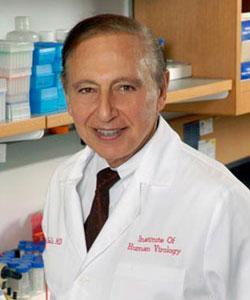 The commissioning of the IHV-Nigeria Campus is expected to revolutionize the fight against emerging infectious and non-infectious diseases in Nigeria and the African Continent.
The commissioning of the IHV-Nigeria Campus is expected to revolutionize the fight against emerging infectious and non-infectious diseases in Nigeria and the African Continent.
“A silver lining of the AIDS pandemic was that it allowed us to have better relations with Africa,” said Dr. Gallo. “In the 1980’s, when we signed the American-French agreement, we agreed that proceeds from the HIV blood test would go to training health care providers in Africa. We owe a thanks to the originators of the U.S. President’s Emergency Plan For AIDS Relief (PEPFAR) program and to our own Prof. Alash’le Abimiku. Through much of the help of PEPFAR and funds for training from the U.S., Nigeria has become our independent collaborators, who I hope will continue to work with us well into the future. I want to extend a hearty congratulations to IHV-Nigeria on the new development. Congratulations on your work, and thank you personally, for carrying the Institute of Human Virology name.”
About the Institute of Human Virology
Formed in 1996 as a partnership between the State of Maryland, the City of Baltimore, the University System of Maryland, and the University of Maryland Medical System, the IHV is an institute of the University of Maryland School of Medicine and is home to some of the most globally-recognized and world-renowned experts in all of virology. The IHV combines the disciplines of basic research, epidemiology, and clinical research in a concerted effort to speed the discovery of diagnostics and therapeutics for a wide variety of chronic and deadly viral and immune disorders, most notably HIV, the virus that causes AIDS. For more information, visit ihv.org and follow us on Twitter @IHVmaryland.
About the University of Maryland School of Medicine
Now in its third century, the University of Maryland School of Medicine was chartered in 1807 as the first public medical school in the United States. It continues today as one of the fastest growing, top-tier biomedical research enterprises in the world — with 46 academic departments, centers, institutes, and programs, and a faculty of more than 3,000 physicians, scientists, and allied health professionals, including members of the National Academy of Medicine and the National Academy of Sciences, and a distinguished two-time winner of the Albert E. Lasker Award in Medical Research. With an operating budget of more than $1.3 billion, the School of Medicine works closely in partnership with the University of Maryland Medical Center and Medical System to provide research-intensive, academic, and clinically based care for nearly 2 million patients each year. The School of Medicine has nearly $600 million in extramural funding, with most of its academic departments highly ranked among all medical schools in the nation in research funding. As one of the seven professional schools that make up the University of Maryland, Baltimore campus, the School of Medicine has a total population of nearly 9,000 faculty and staff, including 2,500 students, trainees, residents, and fellows. The combined School of Medicine and Medical System (“University of Maryland Medicine”) has an annual budget of over $6 billion and an economic impact of nearly $20 billion on the state and local community. The School of Medicine, which ranks as the 8th highest among public medical schools in research productivity (according to the Association of American Medical Colleges profile) is an innovator in translational medicine, with 606 active patents and 52 start-up companies. In the latest U.S. News & World Report ranking of the Best Medical Schools, published in 2021, the UM School of Medicine is ranked #9 among the 92 public medical schools in the U.S., and in the top 15 percent (#27) of all 192 public and private U.S. medical schools. The School of Medicine works locally, nationally, and globally, with research and treatment facilities in 36 countries around the world. Visit medschool.umaryland.edu
Contact
Institute of Human Virology
Jennifer Gonzales
Public Relations & Communications Manager
jennifer.gonzales@ihv.umaryland.edu
Related stories
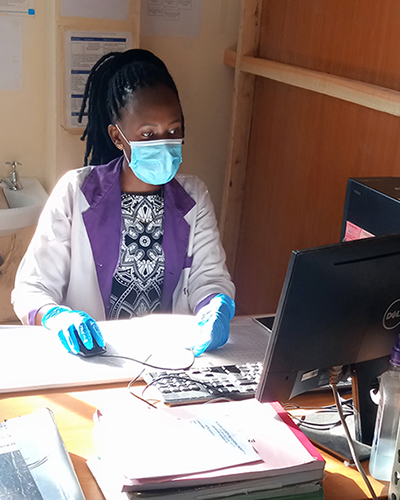
Tuesday, June 02, 2020
UM School of Medicine’s Institute of Human Virology Awarded Grants to Strengthen COVID-19 Response in Sub-Saharan Africa
The Center for International Health, Education and Biosecurity (Ciheb) at the University of Maryland School of Medicine’s Institute of Human Virology was awarded $4 million from the U.S. Centers for Disease Control and Prevention (CDC) to support coronavirus disease 2019 (COVID-19) response activities in Botswana, Nigeria, Malawi, and Mozambique.

Wednesday, May 01, 2019
Large National Survey Shows Smaller HIV Epidemic in Nigeria Than Once Thought and Highlights Key Gaps
(CDC) The Government of Nigeria, the U.S. President’s Emergency Plan for AIDS Relief (PEPFAR), CDC, and the University of Maryland School of Medicine released new data from the Nigeria HIV/AIDS Indicator and Impact Survey (NAIIS), one of the largest population-based HIV/AIDS household surveys ever conducted. The NAIIS directly measured HIV prevalence and viral load suppression. According to the NAIIS results, the HIV prevalence in Nigeria is lower than previously thought, allowing the country to focus on providing services to the areas of greatest need to control the HIV epidemic.


